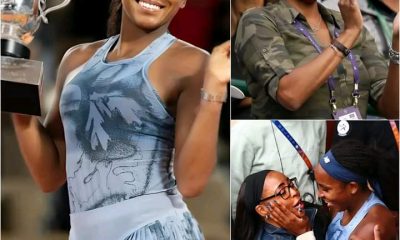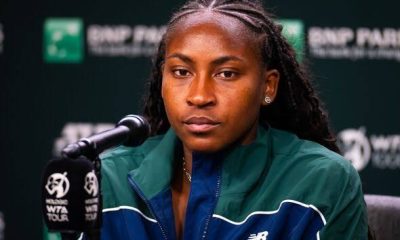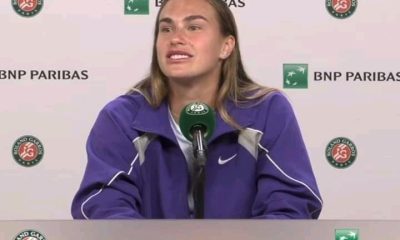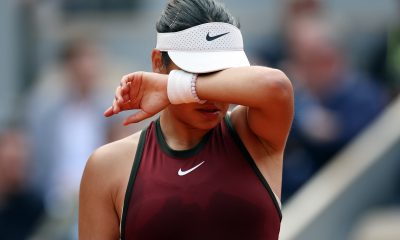Coco Guaff
JUST IN: Coco Gauff Says Aryna Sabalenka’s Comments After French Open 2025 Match ‘Surprised’ Her To Take These Drastic adjustments On…
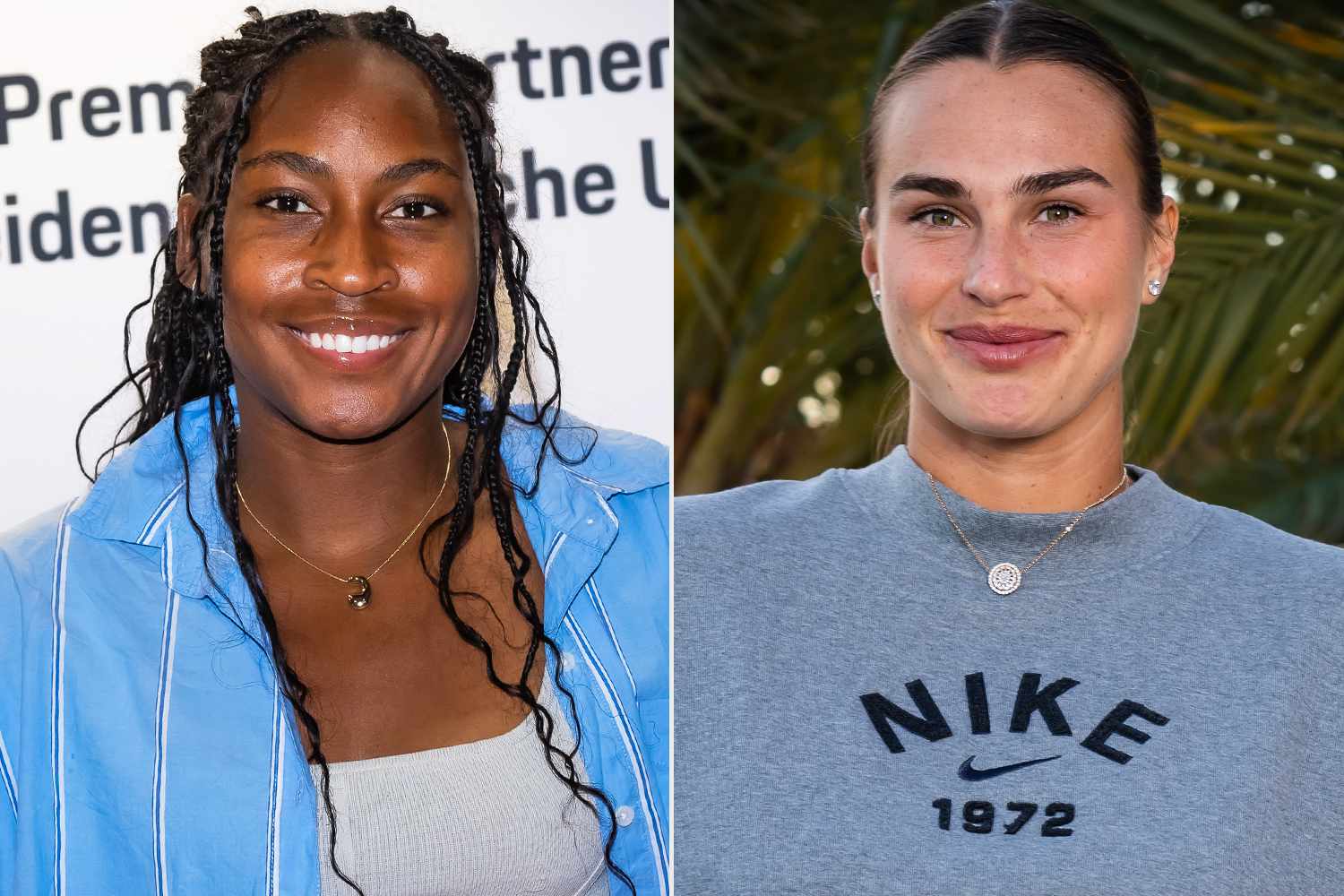
Coco Gauff Says Aryna Sabalenka’s Comments After French Open 2025 Match ‘Surprised’ Her To Take These Drastic adjustments On…
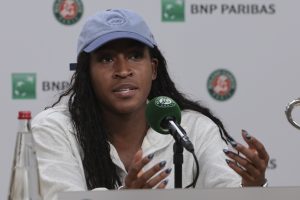
1. The Match Breakdown 🎾
On June 7, 2025, at Roland Garros, No. 2 Coco Gauff defeated top-ranked Aryna Sabalenka in a riveting final: 6–7 (5–7), 6–2, 6–4 (talksport.com, en.wikipedia.org).
- Tense conditions: swirling wind disrupted ball tosses and rally rhythm.
- Sabalenka threw 70 unforced errors, compared to just 30 from Gauff (cbssports.com).
- Mental battle: Sabalenka called it “the worst final” of her career, lamenting her inability to adjust in tough conditions (tennis365.com).
- Resilience prevailed: Gauff rose from a first-set tiebreak loss to dominate the next two sets, claiming her second Grand Slam after the 2023 US Open (talksport.com).
2. Sabalenka’s Post‑Match Comments
A. The Initial Reaction
After the final, Sabalenka shared with the press:
“I didn’t play my best … I made over 70 unforced errors. I don’t think Coco played incredible — she won because I made mistakes.” (people.com)
She also claimed that Iga Świątek, had she reached the final instead, would have beaten Gauff — a statement that sparked media intrigue (talksport.com).
B. Public Backlash & Clarification
Facing criticism for sounding dismissive, she posted on Instagram:
“Coco handled the conditions much better … she was the better player yesterday … She earned that title. Respect.” (youtube.com, people.com)
While acknowledging her own errors, this pivot showed self-reflection and a desire to give Gauff due credit.
3. Gauff: “I Was Surprised” by the Tone 🎙️
On June 9, appearing on Good Morning America, Gauff shared her candid take:
- Surprise: She “was a little bit surprised” by Sabalenka’s original remarks — but noted it was an emotional match, and she’d give her the “benefit of the doubt” (people.com).
- Conditions awareness: Gauff said she expected tough weather — “I saw how windy it was … I knew it was going to be an ugly win” (people.com).
- Respect remains: She emphasized the match was emotional and referred to Sabalenka as a “fighter” and “tough opponent” with no bad blood.
Beyond GMA, Gauff directly addressed Sabalenka’s Iga Świątek comment, calling it “not fair,” reminding the world of her straight-sets victory over Świątek earlier.
4. Why Gauff Was Surprised—and What It Means
A. The Shock Factor
From Gauff’s perspective:
- 70 unforced errors: To her, Sabalenka’s massive error count wasn’t a reflection of Gauff’s shortcomings, but conditions — ones both players faced.
- Undermining her win: The suggestion that Gauff didn’t play brilliantly struck as minimizing her adaptability and grit.
- Comparing to Świątek: The remark felt dismissive of her established record and performance, especially given head-to-head stats.
B. Emotional Context
- Gauff recognized the emotion behind Sabalenka’s comments: a heartbreaking loss on a big stage can warp perspective.
- By extending grace, she maintained sportsmanship—vital for public image and mental well-being.
5. Immediate and Long-Term Adjustments
A. Gauff’s Next Moves
- Mental recharge: She plans to “soak it in”, enjoying her victory before shifting focus to the grass-court season.
- Strategic tweaking: Vogue reports she’s preparing for a more aggressive game on grass ahead of Wimbledon.
- Emotional maturity: Handling this media storm reflects deeper resilience and leadership on and off course.
B. Sabalenka’s Response
- Holistic critique: She labeled the match “the worst final I’ve played” and identified wind and emotion as major factors.
- Learning curve: Sabalenka vowed to adapt smarter next time — controlling errors, staying level-headed.
- Strategic recalibration: She’ll head to Berlin Open on June 16, likely to sharpen clay tactics and mental strategy before Wimbledon .
6. Broader Impacts
A. Rivalry Dynamics
- Gauff now leads 2–0 in Grand Slam finals vs. Sabalenka (US Open ’23 & French Open ’25). WTA narratives are buzzing—will we see a trilogy?
- Each showdown is high-stakes and emotionally charged, creating a thrilling competitive storyline.
B. Media & Sponsorship Angle
- Sabalenka’s comments triggered swift backlash online, prompting a PR pivot—from defensive to contrite.
- Gauff’s composed, empathetic media presence reinforces her marketability and appeal—media-savvy and relatable.
C. Psychological Edges
- Gauff’s emotional intelligence—accepting rough commentary and steering attention to herself—might become a latent advantage.
- Sabalenka’s soul-searching post-loss could fuel a stronger comeback, if she successfully converts frustration into focus.
7. What Comes Next?
A. Berlin Open (Starting June 16)
- Sabalenka: Tune-up on clay, working on composure and strategic shots.
- Gauff: Possible participation—but likely limited, as she weighs rest versus readiness.
B. Wimbledon (June 30 – July 13)
- Both enter as top seeds (Sabalenka No. 1, Gauff No. 2).
- Anticipate departures from clay patterns: quicker ball, flatter groundstrokes, shorter rallies.
- Eyes on a possible grass‐court rematch—tactical game shifts could neutralize emotional baggage from Paris.
8. Final Takeaways
- Gauff showed grace: her surprise was tempered by understanding and sportsmanship.
- Sabalenka reflected publicly: from dismissive to respectful, she owned the conditions and her errors.
- Adjustments ahead:
- Sabalenka: tactical clarity, emotional control, operational refinement.
- Gauff: mental rest, confidence build-up, surface-specific strategy.
This clash wasn’t just about clay—it was a test of character, resilience, and the ability to rise above controversy.
Their rivalry now spans decades in narrative, but each new match resets the emotional ledger.
9. Looking Ahead: What to Watch
| Focus Area | What to Observe |
|---|---|
| Psychology | Will Sabalenka learn from emotional upheaval? Can Gauff stay adaptable? |
| Grass Tactics | Will Gauff embrace aggression? Can Sabalenka tame her powerful serve under control? |
| Media Behavior | Will Sabalenka show more media polish? Will Gauff maintain her empathic approach? |
| The 3rd Duel | A Wimbledon showdown would settle more than scores—it could define their rivalry. |
10. Conclusion
What began in Paris as a match about wind and errors evolved into a story about emotion, respect, and high-performance introspection.
- Gauff, surprised by Sabalenka’s interim dismissal of her victory, responded with grace and clarity—reinforcing her maturity.
- Sabalenka, visibly frustrated by subpar play, initially deflected before offering measured respect.
- The adjustments both implement—mental resilience, tactical refinement, psychological stability—will dictate how this rivalry matures.
As the WTA tour shifts from clay to grass, all eyes will be on how these two respond—not just in points, but in psychology.
And if they meet again at Wimbledon? Expect fireworks—not of controversy, but of electrifying excellence.
-

 Liverpool News5 months ago
Liverpool News5 months ago“He Spoke To Me”: Trent Alexander-Arnold breaks Silence on Real Madrid Snub and Finally Reveal The Reason Why He’s Staying at Liverpool After an Advice From….
-
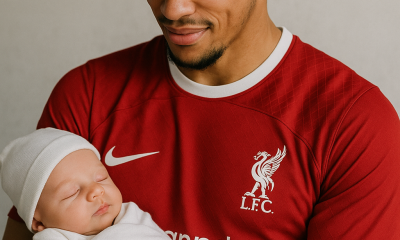
 Liverpool News6 months ago
Liverpool News6 months ago5 Minutes AGO: A Poor Newborn Baby Was Abandoned in a Park Near His Home After The Leicester City Game, in Response To This Heartbreaking Situation, Star Trent Alexander Arnold Stepped In to Become The Child’s Guardian, Pledging To Pay All Living Expenses Until The Child Turns 18….
-

 Liverpool News6 months ago
Liverpool News6 months agoBREAKING NEWS: live from Fabrizio romano, “LET ME GO” Liverpool target set to hand in transfer request to join Liverpool with immediate effect. He said, “I’ve made it clear to the club—I want to leave. The moment I heard Liverpool were interested, my mind was made up. This is a club you don’t say NO to, and I won’t risk waiting around. This is my career, my future, and I’m taking control of it. I’m handing in a transfer request because I want to wear that red shirt. Let me go—this isn’t a request, it’s a warning. My decision is final. It’s Liverpool or nothing.” Yes this is the kind of players we want who want to play for the club and not for the money get him for us immediately the fans are celebrating….
-
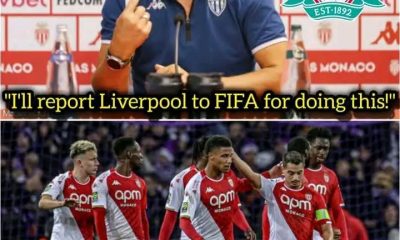
 Liverpool News6 months ago
Liverpool News6 months ago“He visited my office yesterday to inform me about his decision to return to the Anfield this summer. I am not only disappointed in him, but I will also report Liverpool to FIFA for attempting to deceive us.” His return to Liverpool by the summer has been confirmed, but a major issue remains unresolved. HAVING NETTED 15 GOALS IN 6 MATCHES THE MONACO COACH IS DISAPPOINTED IN HIM RETURNING TO LIVERPOOL…..
-

 Featured3 months ago
Featured3 months ago🚨𝐄𝐒𝐂𝐋𝐔𝐒𝐈𝐕𝐀: ARDON JASHARI SARÀ UN NUOVO GIOCATORE DEL MILAN! 🚨 ✅ Accordo totale tra Club Brugge e AC Milan per Ardon Jashari! 🔴⚫️ Il trasferimento si chiuderà su una cifra tra i 37 e i 40 milioni di euro, inclusi bonus, oltre a una percentuale sulla futura rivendita. 💼 Contratto fino almeno al 2030, con stipendio stimato tra 2 e 3,5 milioni a stagione 📝 🔥 Ardon Jashari sarà rossonero. Un colpo chiave per il centrocampo del Milan ✅🔴⚫️
-

 Liverpool News6 months ago
Liverpool News6 months agoIT’S FINALLY OFFICIAL:Trent Alexander-Arnold signs a new long-term contract with Liverpool Amid Motivational Goal Scored Against Leicester City, keeping him at the club until 2028….
-

 Featured3 months ago
Featured3 months ago🚨 ULTIM’ORA: CAOS IN SERIE A – La Roma starebbe elaborando un piano terrificante e minaccioso per strappare il difensore brasiliano alla Juventus, ma Tudor ha lanciato un avvertimento chiaro e diretto al club giallorosso, secondo quanto riportano alcune fonti…
-
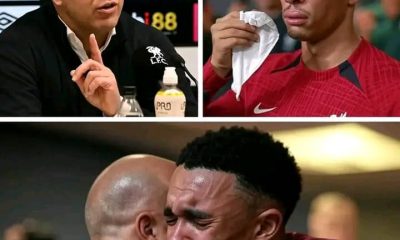
 Liverpool News6 months ago
Liverpool News6 months agoBREAKING NEWS: Arne Slot Makes Surprise Statement On Trent Alexander-Arnold’s Remaining Games for Liverpool After What Transpired On…



